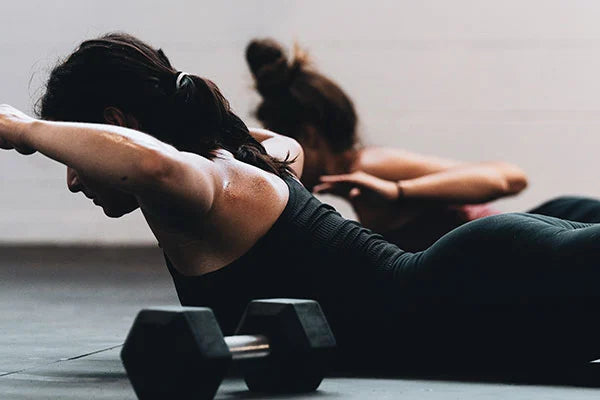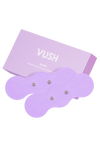
Did you know that your workout routine and diet can affect your menstrual cycle? And not only that, your menstrual cycle can actually impact the way your body responds to exercise and food, too! The VUSH Wellness team breaks down the relationships between exercise, diet and the menstrual cycle, and explains exactly what changes may occur in your body and why.
Can a change in your diet and exercise affect your menstrual cycle?
People sometimes notice changes in their cycle when going through monumental life changes like a new work routine or a big move. Diet and exercise changes are no different! Fluctuations in eating habits and workouts can definitely affect your period, whether your flow has gotten lighter or heavier, you’re experiencing pain, your period isn’t coming at all, or your cycle length has changed completely. Your menstrual cycle tends to be a pretty reliable indicator of your overall health.
How can the menstrual cycle affect exercise?
Your energy levels will change throughout the four stages of the menstrual cycle: menstruation, the follicular phase, ovulation, and the luteal phase. This means your desire and ability to exercise will change too! The fluctuation in energy levels will impact the type of exercise your body thrives on. If you are struggling to stick to a regular exercise routine or type of workout, tracking your cycle may provide some helpful explanations.
Here are our recommendations for exercise during each phase of the cycle:
Period
Gentle movement such as walking or yin yoga. Your body needs rest during this time.
Follicular Phase
Diverse movement such as strength training, swimming or dance class. This is a chance to try something new.
Ovulation
Strenuous movement such as weight lifting or running. Now’s the time to go for those PBs!
Luteal Phase
Moderate-gentle movement such as slow jogs or yoga flows. Ease into preparation for your period.
The benefits of regular exercise
Regular exercise is not only good for your mind and muscles, it can also play a big role in supporting your menstrual cycle. Here’s how:
Increases energy levels
Exercise releases feel-good chemicals in the brain, or endorphins, sometimes known as “happy” hormones. Ever felt that post-workout high? There is a chemical explanation for this! Even if you don’t feel like you have the energy to exercise, you will most likely end the exercise session feeling more energetic. It’s important to use the power of exercise to your advantage during slower, more lethargic phases in the menstrual cycle, such as the lead up to your period or during your bleed.
Reduces period pain
Exercise can alleviate pain by releasing endorphins, which are also the body’s natural painkillers. This can be very helpful for those struggling with period pain, whether it’s abdominal cramps or lower back pain. While you’re on your period, you may not feel up to a highly strenuous workout, but even a slow walk or gentle yoga session has the potential to make you feel slightly better. Exercise really does help period cramps!
Increases strength
Did you know that, during the follicular phase when your hormone levels are low, strength-based exercise may lead to increased muscle and greater gains? If you’re committed to strength exercises like resistance training and weights, tuning into your menstrual cycle may help you access your strongest self.
What if I don’t regularly exercise?
A lack of regular exercise means you may be missing out on some mood-boosting endorphins! Regular movement is vital, not only for supporting your cycle but for physical and mental health. No need to turn into a gym junkie immediately, how about starting with a daily walk, a weekly social netball game, or a pilates class here and there?
How much exercise causes missed periods?
Too much exercise can cause your period to disappear temporarily. How much is too much? Well that differs for everyone. It is common for athletes to lose their period because of their intense exercise regime. People also often wonder if exercise can delay your period, which is definitely a possibility with a strict workout routine. If you’re not a professional athlete, but you’re concerned about not having your period due to exercise, speak to a doctor or healthcare professional.

How can the menstrual cycle affect diet?
Your food cravings and the nutrients your body requires may also change within the four stages of the menstrual cycle. Your hunger levels can change, as many people report feeling particularly ravenous just before or during their period. Tracking your cycle and being aware of what your body needs during each stage can help.
Here are our nutrition recommendations to support each phase of the cycle:
Period
Look for foods or supplements with iron, zinc, vitamin C and magnesium. Create warm and nourishing meals with anti-inflammatory foods. Indulge in comfort foods and soothing drinks.
Follicular Phase
Look for foods or supplements with iron and zinc. Aim for fibre and energy boosting foods. Try fermented foods or vegetables. Keep meals light but nourishing.
Ovulation
Aim for fibre and antioxidants through vegetables. Prioritise anti-inflammatory foods, liver-supporting foods, and light and leafy foods.
Luteal Phase
Focus on supporting hormones through fruit, fibre, protein, starchy vegetables, and magnesium-rich foods.
The benefits of a healthy diet
It’s no secret that there are many, many benefits of eating balanced meals on a regular basis. An added advantage of a healthy diet is supporting the menstrual cycle! Here are some ways a healthy diet can impact the menstrual cycle:
(This article is not intended to replace qualified healthcare. Always chat to a doctor, dietician, or naturopath before making big diet changes.)
Reduces PMS symptoms
If the week before your period is hell for you, some simple diet switches or additions may ease some of this pain. Read about exactly what premenstrual syndrome (PMS) is here. Some healthcare professionals suggest that vitamin b6, vitamin b1, magnesium, zinc, along with omega-3 fatty acids like vitamin D, calcium, and fish oils can assist with reducing PMS symptoms.
Reduces mood disturbances
One of the main symptoms of PMS relates to unstable moods. There are lots of vitamins and supplements that have been associated with reducing mood disturbances, including B vitamins, vitamin D, magnesium, calcium, and zinc.
Reduces menstrual blood flow
If you're struggling with heavy periods, a few diet changes or supplement additions may help. Vitamin C is said to reduce menstrual blood flow, so it may be worth adding some extra orange or a vitamin C supplement to your diet.
What if I don’t have a healthy diet?
Difficulty maintaining a healthy diet is something we all struggle with from time to time. We’re not here to tell you to make huge dietary changes all at once (especially without proper medical advice). Perhaps you begin to make healthier changes by focusing on adding a few extra nutrients to your diet around the time of your period. We recommend starting to think about your diet more closely during the luteal phase 1-2 weeks before your period is due, as this can be the most difficult and debilitating time in the cycle for many, and can help support your body in the preparation for your period.
Read more in Wellness:
For more on periods, read our beginner’s guide to surviving your period or learn about the causes of period pain. We also have blogs on chronic illnesses that affect periods, such as endometriosis, PCOS, and PMDD. You can learn about the menstrual cycle or even discover how the cycle affects libido and sex drive.
We also have the perfect wellness product for those with periods (and those without). Read about the benefits of a TENS machine and shop Aura, our pain relief device now.







Leave a comment (all fields required)